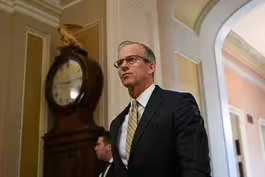
Protestors across the U.S. rally against Trump’s policies
Clip: 4/5/2025 | 7m 22sVideo has Closed Captions
Protestors join more than a thousand rallies across the U.S. against Trump’s policies
People across the country and around the world turned out on Saturday for what organizers say has been the single biggest day of protests against President Trump and his second-term actions. In the U.S., more than a thousand rallies were planned in small towns and major cities from coast to coast. Ali Rogin reports on the protests and John Yang speaks with historian Beverly Gage for more.
Problems playing video? | Closed Captioning Feedback
Problems playing video? | Closed Captioning Feedback
Major corporate funding for the PBS News Hour is provided by BDO, BNSF, Consumer Cellular, American Cruise Lines, and Raymond James. Funding for the PBS NewsHour Weekend is provided by...

Protestors across the U.S. rally against Trump’s policies
Clip: 4/5/2025 | 7m 22sVideo has Closed Captions
People across the country and around the world turned out on Saturday for what organizers say has been the single biggest day of protests against President Trump and his second-term actions. In the U.S., more than a thousand rallies were planned in small towns and major cities from coast to coast. Ali Rogin reports on the protests and John Yang speaks with historian Beverly Gage for more.
Problems playing video? | Closed Captioning Feedback
How to Watch PBS News Hour
PBS News Hour is available to stream on pbs.org and the free PBS App, available on iPhone, Apple TV, Android TV, Android smartphones, Amazon Fire TV, Amazon Fire Tablet, Roku, Samsung Smart TV, and Vizio.
Providing Support for PBS.org
Learn Moreabout PBS online sponsorshipJOHN YANG: Good evening.
I'm John Yang.
Across the country and around the world today, tens of thousands of people turned out for what organizers say has been the biggest single day of protest against President Trump and his second term policies and actions in this country.
More than a thousand rallies were planned in small towns and major cities from coast to coast.
Ali Rogin begins our coverage.
ALI ROGIN (voice-over): In Washington, crowds descended on the National Mall, calling for lawmakers to rein in President Trump.
KELLY KEALY, Demonstrator: He's right now destroying our economy.
He's taken away all of our allies.
We're a pariah in the world and Congress sits back and does nothing.
ALI ROGIN (voice-over): The mass protest, dubbed the Hands Off National Day of Action, was organized by advocacy groups that opposed the president's policies during his first term.
Protesters railed against Mr. Trump's recent moves to lay off scores of federal workers, revoke protections for immigrants, and implement sweeping tariffs.
But for Democratic leaders, the president's threat to democracy took center stage.
REP. JAMIE RASKIN (D) Maryland: Our founders wrote a constitution that does not begin with we the dictators.
The preamble says we the people.
ALI ROGIN (voice-over): The movement spread far beyond the nation's capital, from the sidewalks of South Bend to downtown Boston and New York City.
Demonstrators took to the streets in protests, both big and small to oppose President Trump's agenda.
That resistance echoed around the globe.
In Germany, England, and Portugal, protesters flocked to public squares to show support and solidarity with Americans.
BILLY EASTON, Demonstrator: Freedom is at stake in the United States and for the whole world with what Donald Trump is doing.
And we need to stand up.
ALI ROGIN (voice-over): For PBS News Weekend, I'm Ali Rogin.
JOHN YANG: These protests cap a tumultuous week.
Overnight, President Trump's 10 percent global tariffs went into effect.
And in anticipation stocks lost trillions of dollars in market value in just two days.
Beverly Gage is a professor of history and American studies at Yale University.
Beverly, is there any precedent or even analogous events to what we've seen in the past few days?
BEVERLY GAGE, Yale University: Well, we've certainly had tariffs before in American history.
No, not on this scale and not for a while.
But I cannot think of another moment when it seemed like the White House and the president had deliberately tanked the stock market and told everyone, hey, no worries.
It's going to be okay.
JOHN YANG: You say there have been tariffs in history.
What has history taught us about tariffs?
BEVERLY GAGE: Tariffs were a big part of the way the federal government got its money in the late 19th and into the early 20th century.
We didn't have an income tax, and this was a huge source of federal revenue.
And we sort of did away with them because they were seen to create instabilities, to create these wild cycles of boom and bust that were so characteristic of that period, and then also to really be a source of political corruption and favoritism.
And a century ago, Americans decided that really wasn't the way they wanted to run their country.
But it looks like we're heading back to that now.
JOHN YANG: In recent years, we've seen presidents trying to globalize the economy, trying to make the United States part of a global economy.
And now the President seems to be fencing off the American economy from the rest of the world.
What do you make of that?
BEVERLY GAGE: I think that's a really important distinction.
If we go back to the 19th century, into the Gilded Age, which seems to be a period that Trump and his allies are thinking a lot about, looking back to, it was a very different story because you hadn't had a whole century of these ties across the continent, across the globe, and this kind of global business world that now is really being dismantled in many ways.
JOHN YANG: Taking a broader look at the administration, what's happened so far, we've seen President Trump trying to reshape the federal government through DOGE, trying to reshape relations with longtime allies and with trading partners and with the developing world.
And we're not even at the 100-day mark.
Can you think of a time where a president who's hit the ground running so hard and so fast?
BEVERLY GAGE: I think you can look at something like Franklin Roosevelt's first hundred days, which is where really we get this idea of the first hundred days as a critical period.
Lots of things happened, lots of things changed, and they were pretty fundamental changes in the political economy.
Americans were able to start drinking again because he ended prohibition.
But that moment, I think, is different from this one because people understood Roosevelt to be addressing really a cataclysmic crisis at home, the Great Depression abroad, the rise of fascism.
And now it seems like the crisis is sort of coming from the White House more than anything else.
JOHN YANG: Can the president keep up this pace of activity?
And also can the body politic keep up with this pace?
BEVERLY GAGE: It has been, I think, really overwhelming for lots of people, myself included.
And as you say, it's still pretty early on.
So we might think that some of this will slow down as the courts come in, maybe as Congress begins to try to play a bigger role in all of this.
But, you know, I think the Trump administration has been very smart at kind of creating narratives, controlling the news cycle, rolling things out piece by piece.
They didn't just come out and say, we're going to cut 10 percent or 50 percent of all government agencies or all universities are going to have to do that.
They're making it very personal and they're doing it bit by bit.
And it's possible that could go on for quite a long time.
JOHN YANG: Is this an inflection point in terms of the United States role in the global world order and relationship to the global world order, or is that taking it too far?
BEVERLY GAGE: I do think that it's an inflection point.
Not because we know all of the consequences yet, not because it's a done deal or nothing's going to happen.
We're seeing waves of protest, lots of pushback starting.
So we're still very early on.
But I think what's happened in a pretty fundamental way is that a lot of certainties have been upended.
Certainty that if you are a scientist, you're going to be able to think about a lifetime career in the United States and think about sources of funding.
Same thing for federal workers.
And I think that you can take that into the global scale as well.
Diplomatic relations, business expectations, all of these have been pretty profoundly disrupted.
And we might go back, we might change policies, but the fact that people can't be really secure anymore about what the fundamental assumptions and structures are through which to plan for the long term, I think that's not something that we're going to go back from so easily.
JOHN YANG: Beverly Gage of Yale University, thank you very much.
BEVERLY GAGE: Thank you.
Are gummy vitamins as effective as vitamin pills?
Video has Closed Captions
Clip: 4/5/2025 | 5m 39s | Are gummy vitamins as effective as traditional vitamin pills? (5m 39s)
How old whaling logs help scientists track climate change
Video has Closed Captions
Clip: 4/5/2025 | 7m 29s | How 200-year-old whaling logs are helping scientists track climate change (7m 29s)
News Wrap: Senate pulls all-nighter to pass GOP budget bill
Video has Closed Captions
Clip: 4/5/2025 | 3m 9s | News Wrap: Senate pulls all-nighter to pass Republican budget bill (3m 9s)
Providing Support for PBS.org
Learn Moreabout PBS online sponsorship
- News and Public Affairs

FRONTLINE is investigative journalism that questions, explains and changes our world.

- News and Public Affairs

Amanpour and Company features conversations with leaders and decision makers.












Support for PBS provided by:
Major corporate funding for the PBS News Hour is provided by BDO, BNSF, Consumer Cellular, American Cruise Lines, and Raymond James. Funding for the PBS NewsHour Weekend is provided by...


